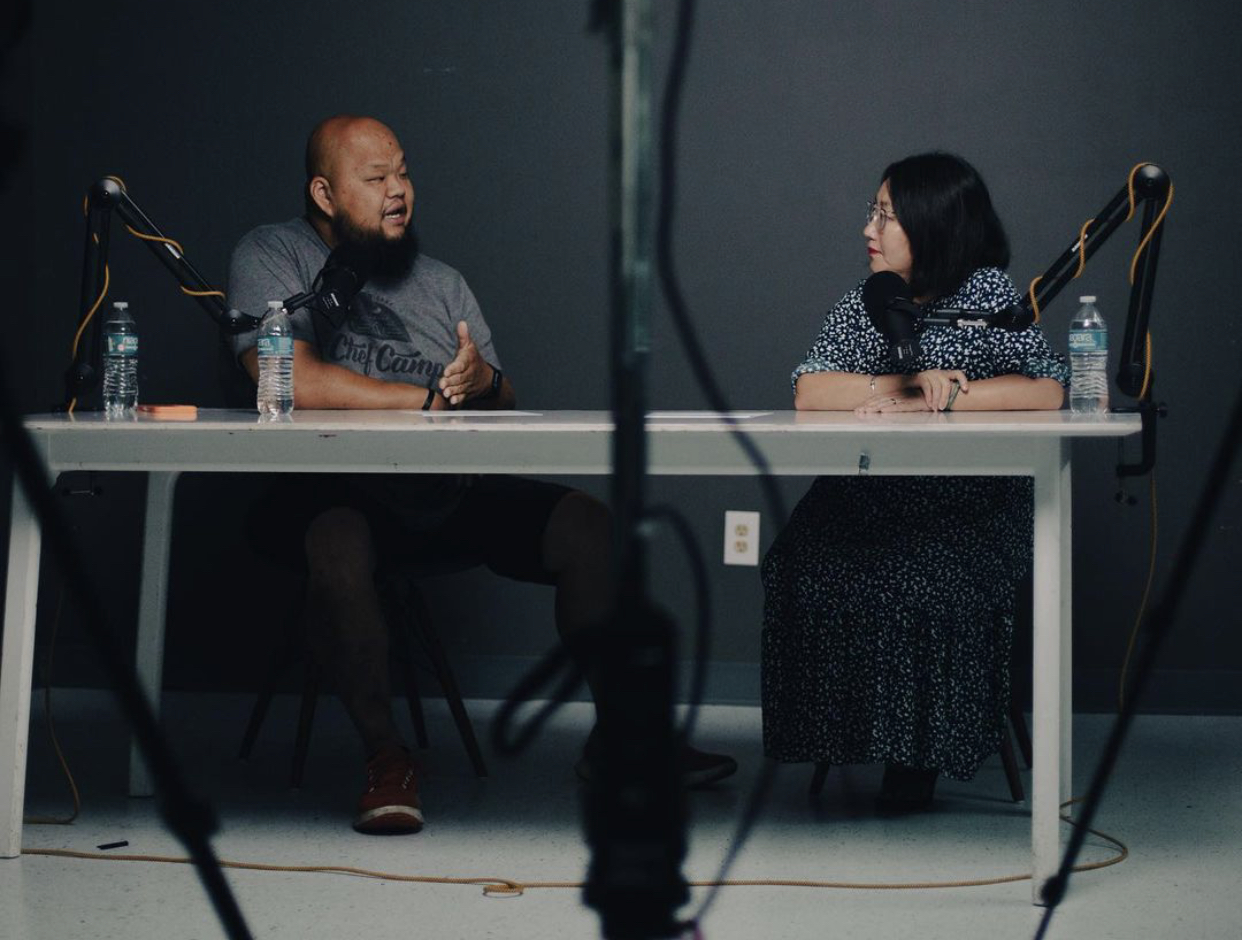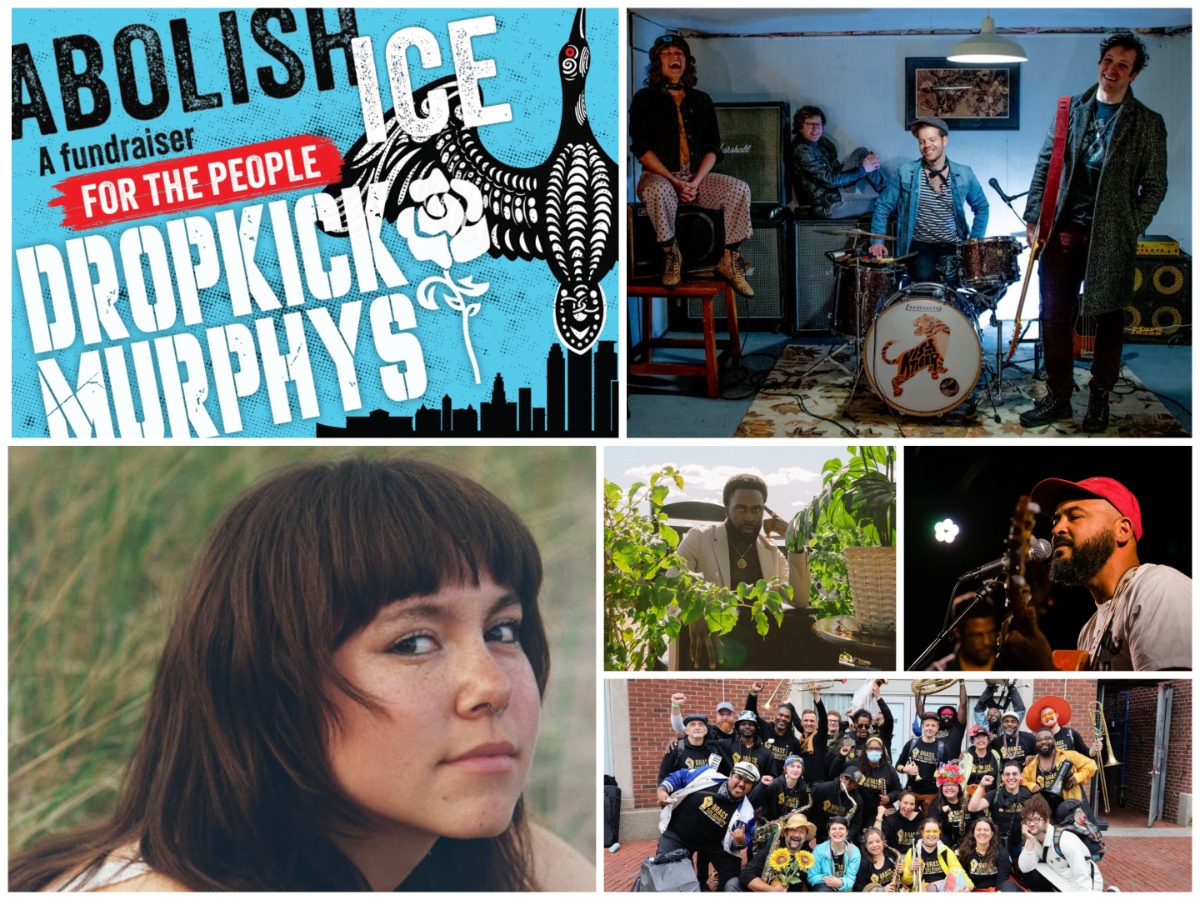Podcasts: There are a lot of them! Esquire just released a list of 88 to listen to in 2022; even less ambitious outlets compile annual lists of 40 or 50 shows that demand your attention.
But you’ve only got two ears and 24 hours in the day, which is why your buds at Racket present here a more modest, locally angled collection. We spoke with seven Minnesota-based podcasters about seven-plus podcasts (some of them run full-on podcasting networks) to bring you the following recommendations. Our podcasting scene may be small and under-hyped, but it’s also percolating with original shows—some of which have even appeared on those fancy, lengthy best-of lists themselves.
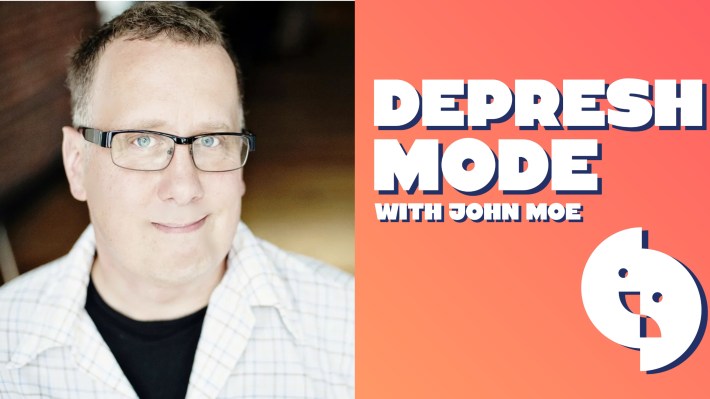
Depresh Mode (Maximum Fun)
When actor and comedian Joel Kim Booster spoke with Depresh Mode last summer, he was in a really bad place. An almost unbearably bad place. The title of the episode is “Joel Kim Booster Is In a Pit,” because host John Moe says it’s the only way he could think of to describe what the Fire Island star was going through.
Even for a podcast about depression, the episode takes listeners through some pretty low lows. “You often end up talking to people who have dealt with it, but they’re on enough of an upswing that they’re willing to talk about it,” Moe says. “This is somebody at the very nadir of what’s going on.” The 52-minute conversation is uncomfortable at times, peppered with long, painful pauses. It’s also an example of the podcasting format at its best, earning praise from outlets including Mic and The A.V. Club.
Moe has been candidly discussing depression for years, first on the MPR/APM podcast The Hilarious World of Depression. With Depresh Mode, which started last year after Moe and his show were axed from the network, you get a program created with the care and expertise of a public radio production and the looser, freeform flow of an independent podcast.
Even five years ago, Moe says, there was less willingness to talk openly about depression, more stigma around mental illness. “It’s invisible, it doesn’t show up on X-rays, and it speaks in your own voice,” he says. “That’s part of the reason why I think it’s so scary, and why people have avoided talking about it: Here’s this invisible thing that might try to kill you.”
“I think my show has come along at a time when that’s really starting to lift,” he continues. “It’s a bit like how smoking or drunk driving or littering were in the past, where society just said, ‘OK, this is a dumb way to handle this. Let’s handle it better and save more lives.’”
Moe is from Seattle—he and his family moved out here when he took the job at MPR—but he chose to stay in Minnesota even after that relationship ended. “There was just this sort of collaborative vulnerability that Minnesota has, that I think is really unique to a lot of other places.” Even though he jokes that his podcast company is “me and the dogs,” he feels like people in the community are invested in his success.
Depresh Mode guests have included comics (Patton Oswalt), actors (Jamie Lee Curtis), musicians (Open Mike Eagle), and athletes (Kevin Love). Surgeon general of the United States Vivek H. Murthy was on the show recently; Amanda Knox was a guest back in January. The podcast swings from serious to silly, and mostly discusses depression in a way that… well, isn’t all that depressing.
“People want to talk, but I sometimes compare it to a junior high dance: Everybody’s pinned against the wall until somebody gets out there and starts dancing,” Moe says. “That’s the conversation around mental health. So, I’ll go out on the dance floor. That’s fine.”
Apple Podcasts | Spotify | Website
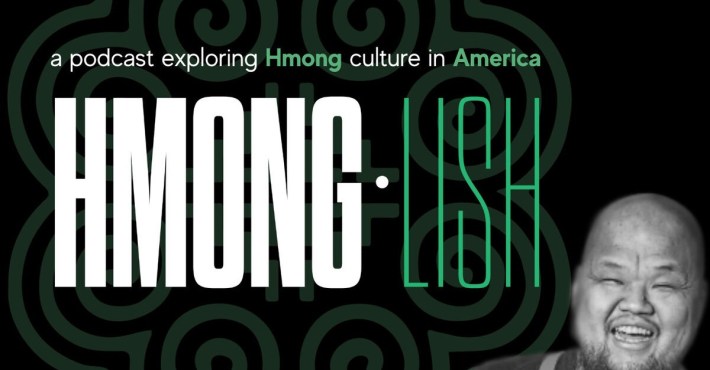
Hmonglish (Gleam Tower Media)
“I don’t mean to say this to be mean or anything,” chef Yia Vang says of his new podcast, Hmonglish. “But this podcast wasn’t created for white people to listen to.”
Vang isn’t saying, “Don’t tune in, delete this from your Stitcher feed!!!” In fact, the podcast is produced by Matt Gundrum of Gleam Tower Media—“a white dude,” Vang chuckles, who doesn’t understand all the nuances of Hmong culture, and whose curiosity sometimes leads him to toss out questions to guests that Vang himself wouldn’t think to ask.
What he means is that this is a podcast created for Hmong people, specifically. “This is like family talk,” he says, “and then the white community gets to listen in.”
Hmonglish started with a straightforward enough question: What does it look like to have a conversation about being Hmong in America? The name comes from the distinct dialect Hmong kids grow up speaking in the United States; though your parents might insist on speaking Hmong at home, there are English words that just don’t exist in the language, especially when it comes to new technology.
“We would throw those English words in, and joke that we’re speaking ‘Hmonglish.’ How do I say ‘computer?’ How do I say ‘TI-89 calculator?’” he asks. “I’m Hmong, but I live in two worlds. How does that work?”
Vang’s previous podcasting experience includes White on Rice, in which he and co-host David Crabb spoke with interesting people throughout the Twin Cities in all kinds of fields (including one of Racket’s own). That series is currently on hiatus as the always-busy Vang creates Hmonglish, and helms Union Hmong Kitchen, and gets Vinai up and running, and hosts a new Outdoor Channel series called Feral.
Unlike White on Rice, Hmonglish specifically highlights members of the Hmong community. Some are like Pahoua Yang Hoffman, a senior VP at HealthPartners—folks who don’t usually get to talk to the media. Others are like Kao Kalia Yang, who, despite being a notable author, doesn't typically have a chance to speak in depth about being Hmong.
Vang describes his role here as that of a “big brother”—showing Gen Z and millennial Hmong listeners that the issues they’re dealing with aren’t unique to them, and that there’s nothing shameful about feeling caught between two cultures. That even the most successful Hmong people have struggled with a feeling of not belonging, and that your parents, though well intentioned, might not quite understand what you’re going through.
“It’s this idea for the next generation,” Vang says. It’s one thing to talk to his parents’ generation about immigrating to America, another to talk to those who came to this country at a young age, like he did. “But what about the idea of two cultures colliding together to create a third culture?”
“I want my nieces and nephew to be able to listen to this,” he continues. “I want a young Hmong kid to listen to this and say, ‘Wow, I can think forward here, and I can think about doing something beyond the status quo.”
Apple Podcasts | Spotify | Instagram
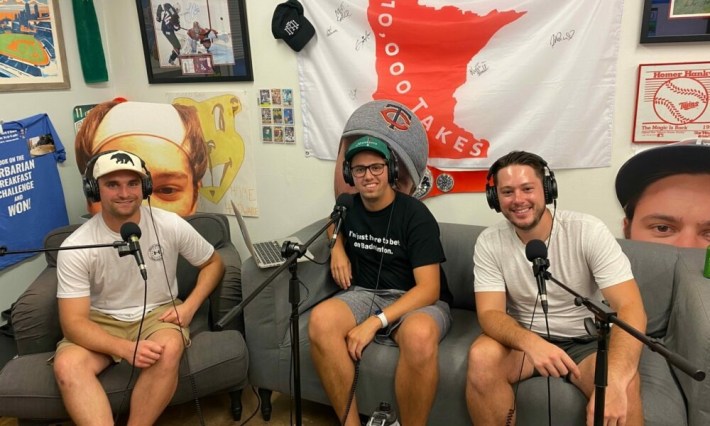
10,000 Takes (Self-Produced)
In the summer of 2019, freshly printed University of North Dakota diploma (figuratively) in-hand, Jack Leverentz surveyed the various media booths populating the Minnesota State Fair.
“I thought: Well, it’s cool we have so much good sports coverage,” the Twin Cities-raised marketing major remembers. “But there’s not anything that’s really grassroots, everyday guy, authentic, loud, unfiltered coverage that fans can really relate with.”
Specifically, our sports-talker market lacked anything resembling the mega-popular Barstool Sports media empire that was spawned by mastermind/shithead Dave Portnoy. Alongside co-founders Jake Bringgold and Zane Wagner, Leverentz set out to change that with 10,000 Takes.
Today, the 10K Takes multimedia mini-empire has attracted over 180,000 social media followers and earned a weekend sports-betting show on KFAN, It's a Bet. The early product, which was produced on a “gross, shitty” Wix website in late 2019, began with a jokey post about a vividly avuncular Twins pitcher: “Twins Pitcher Randy Dobnak Looks Like a Guy Who Owns Three Motorcycles MINIMUM.”
Just as the 10K Takes crew began finding their loose, boozy, and snakebitten-yet-diehard Minnesota sports fanatic voice, the sporting world shut down.
“We were pretty invested in Korean baseball for a little bit, because that was the first thing to come back,” Leverentz says with a chuckle. “It was like, ‘Thank God there’s something to watch.’”
At the time, the local sports podcast scene was similarly barren, Bringgold reports.
“Everything was very serious—all the same, analytical, stat-based, almost trying to be KFAN,” he says. “We definitely tried to shy away from that.”
The fun, fratty formula is working. During partnerships with KFAN and all four local pro teams, the fellas have to mind their drinking and FCC regulations. But on flagship podcast It’s A Bit, one of seven on the company roster, they kick it with guests like Vikings QB Kirk Cousins, Wild GM Bill Guerin, and recently viral Vikes announcer/KFAN personality Paul Allen. Cumulatively, the pods notch around 7,000 monthly listeners; the greater 10K Takes media apparatus—including its Twitter meme mastery—scores around 14 million social impressions per month, according to Bringgold. As with KFAN, it’s general lifestyle programming for guys where you’re as likely to get a draft of the best Thanksgiving foods as a breakdown of Xs & Os. The key difference: These guys are in their 20s, unlike the greyhair hosts at the ‘FAN.
Flexing his marketing-grad credentials, Leverentz throws around terms like “scale our e-commerce,” a core area of the biz that’s bolstered by a strong merch game. All three co-founders work day jobs, but they think they’ve tapped into something that’ll one day pay the bills—and fuel their gleeful gameday betting.
“Our average fan is someone who lets sports control their life,” he says. “These teams are who we are as people. If you take away sports, I don’t know what kind of person I am. They’re in a similar boat: live, breathe, eat sports.”
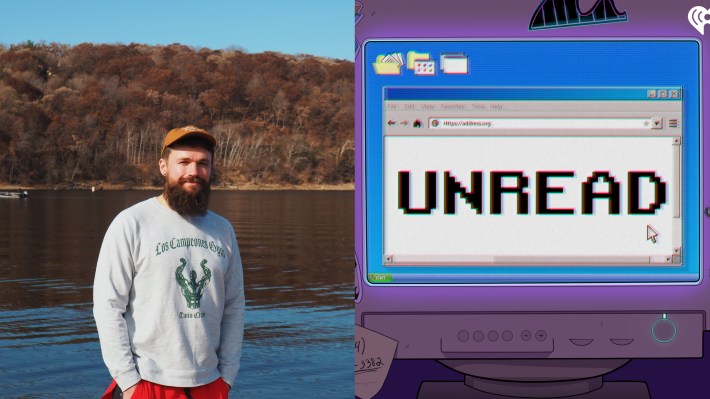
Unread (iHeartMedia)
Three years ago, Minneapolis-based writer and educator Chris Stedman got an email from his friend Alex. The two hadn’t spoken for months, and the email, it turned out, had been scheduled—Alex was writing to let Stedman, his friend of more than a decade, know that he’d ended his life.
But that wasn’t all Alex’s goodbye note contained. There was also a link to a Soundcloud, where Stedman found a collection of audio files. His friend, a Britney Spears superfan, had been chatting with someone he met in a fan forum—someone who sounded an awful lot like the pop icon turned Instagram dancing queen herself.
Fueled by loss, guilt, anger, and love, Stedman embarked on a journey to figure out who this woman was and whether he could determine why Alex included the files in his final farewell. The result would become Unread, a four-episode, nonfiction, mystery podcast that weaves a tale about Alex, about Britney, about friendship—and about the silence and shame that are wrapped up in suicide loss.
“I write as a way to kind of process, particularly with things that are so big that I’m trying to just get my mind around them,” Stedman says. Often, that writing doesn’t end up published anywhere—only when he thinks it might be useful to others. He reads for many of the same reasons; when he was coming out as queer in his adolescence, for example, narratives from other queer people provided the roadmaps that guided him on his path.
Nothing like that was readily available when he lost one of the most important people in his life to suicide. “I wanted to make something that I could have listened to in the weeks after he died that would have maybe helped me make sense of what I was experiencing and feeling,” Stedman says.
The podcast is a loving tribute to Alex, and the mysterious Britney sound-alike hook propels the story forward. But it’s also about the systemic circumstances of suicide and the questions we’re left with when someone close to us dies.
“I grew up in Minnesota, I’m very Minnesotan, and so I have a hard time accessing my anger,” Stedman laughs. After Alex’s death, he found he was struggling to make sense of why he was so angry, eventually realizing it was a frustration with the systems that should have kept his friend alive and didn’t. As a worker from the Trans Lifeline crisis hotline explains in one episode, we look at people who consider suicide as having an irrational moment—but what’s irrational about not wanting to be alive in a world that doesn’t care if you live or die? Or that’s actively hostile to your very existence?
Unread has been a favorite of Vulture pod correspondent Nicholas Quah, who’s recommended it more than once, and it was one of the best podcasts of 2021 in Mashable and The Guardian. It also won a Webby this year for best writing.
“He was one of the most incredible people I’ve ever met,” Stedman says of Alex. “And yet, he was someone who didn’t quote-unquote accomplish anything that the world deems valuable, and so his life is the kind of life that doesn’t get memorialized, doesn’t get remembered. I just found myself feeling like his story matters. His life deserves to be remembered… for me and everyone else who knew him, his presence in our lives was incredibly impactful.”
You’ll understand why as you learn about him in this moving, funny, and curious podcast, which doesn’t define Alex by his death, but by his life.
Apple Podcasts | Spotify | Website
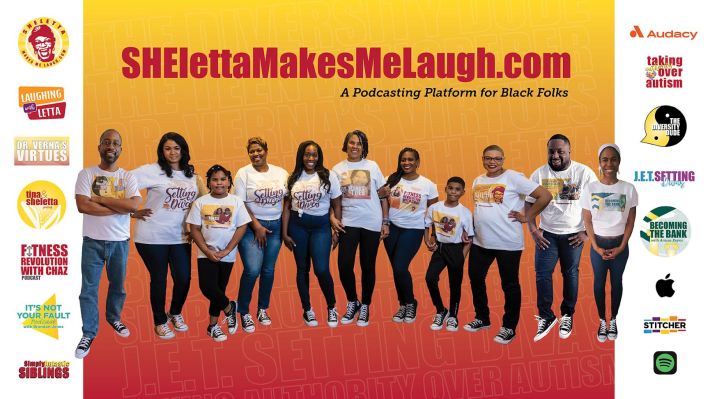
Sheletta Makes Me Laugh (Self-Produced)
Before launching her local podcasting network, Sheletta Makes Me Laugh, Sheletta Brundidge attempted to make terrestrial radio in the Twin Cities more representative of the listenership.
“I went to my bosses at ‘CCO, and said we need to have more primetime on-air diversity. I said the ‘R’ word [racism], and then they had to call a big meeting,” she says, remembering the panicked assemblage of executives and HR pros. “They kept saying, ‘We just don’t have anybody…’ I’m sitting right here!”
Brundidge had at least one fiery advocate in Chad Hartman, the radio station’s drivetime heavyweight. She says Hartman stormed into offices, banged on desks, and very vocally vouched for her opportunity to host. “He almost lost his job, I was like, ‘Dude, calm down!” she remembers with a loving chuckle.
Around that time, in 2019, Brundidge walked through the lobby at WCCO headquarters, where she noticed portraits hanging of every major host in the station’s century-long history. “The Good Neighbor” had a historically uniform look, she says: Almost all of ‘em were white men.
“I realized they were never going to make a move,” says Brundidge, who still produces and, now, hosts at WCCO. “Instead of fighting for a seat at the table, I built my own table.”
Sheletta Makes Me Laugh started as a humble table, a place where the CEO could connect with Black listeners and share uplifting, underreported stories from the Black community. In early 2020, that was accomplished through her own show, Laughing with Letta, but soon the network ballooned to 11 shows. Dr. Verna’s Virtues is a life-coachy pod about achieving goals; J.E.T. Setting Divas takes listeners on world travels; Becoming the Bank helps you stack generational wealth; It’s Not Your Fault focuses on teen mental health. The bet that Brundidge placed on herself—that “Black people were hungry to hear voices like their own”—appears to be a winning one.
After not providing a salary in those early days, Sheletta Makes Me Laugh is “a whole fuckin’ busines” now, Brundidge says. Sponsors like Hy-Vee, Comcast, General Mills, Target, and Camping World have gravitated toward the network, though “I had to train companies how to treat me as a Black female business owner,” Brundidge says of early lowballers who tried to pay with T-shirts and event tickets.
So far the biggest hit episode came from two of Brundidge’s kids, Brandon and Cameron, who host the Simply Autastic Siblings pod. Last month, the kids’ Mall of America interview with Nickelodeon star That Girl Lay Lay soared past 50,000 listeners, their proud mom reports.
Brundidge’s short-term plan is to “stop doing all this shit on my own,” she says, referring to recording, editing, and promoting podcasts from her home basement studio in Cottage Grove. Long-term? She hopes Sheletta Makes Me Laugh can make young folks discover their potential through podcasting.
“I want to train the next generation of Black broadcasters,” she says. “I want to let these young people know they have a voice.”
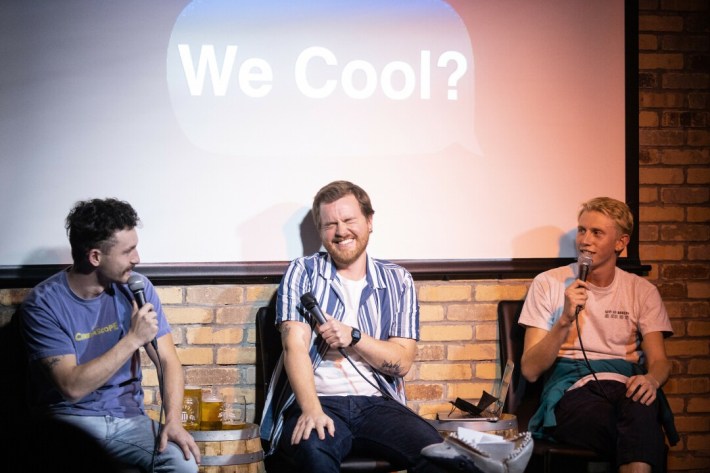
We Cool? (Self-Produced)
Unscientifically, we’re comfortable stating the most saturated genre of podcast is “three white dudes aimlessly riffing.” Odds are (again, unscientifically) those dudes will also be standup comedians. That’s the trap locally launched comic buddies Tommy Bayer, Ryan Kahl, and Grant Winkels set out to avoid when they cooked up We Cool? in 2018.
Back then, the three hilarious pals were mere colleagues, working together and getting early stage time at Comedy Corner Underground.
“It seemed like a natural fit,” Winkels remembers. “It truly comes down to: We think we’re all funny. It’s a circular feedback loop, whether for good or bad.”
Funneling that humor through a format was the challenge, and Winkels arrived at the solution: forgiveness. But We Cool? doesn’t explore the concept in a mushy, ruminatory, spiritual sense. Instead, the pod takes emails from anonymous listeners who are either demanding or offering apologies for various misdeeds of varying consequence. “In addition, we will try to apologize for things in our lives and thematically tie that in,” Winkels explains. The gimmick is a fun launching pad for jokes, riffs, japes, etc., as well as stories from the hosts’ careers. (The Brooklyn-based Bayer, who returns home this weekend to headline CCU, discussed his viral The Bear parody at length on the pod.)
Winkels intended to apologize for “inadvertently and shittily” breaking up with his high school girlfriend—on her birthday. But before he could, she wrote in demanding one, which he happily obliged 10 years after their split. Another submission dealt with accidental destruction of an expensive grand piano; fellow comics will sometimes call in seeking contrition from the hosts over their bad jokes. For nameless listeners atoning for old sins, We Cool? can offer something kinda, sorta, not really approaching accountability.
Submissions were tough to come by early on, Winkels says. But, 120+ eps later, the show has a steady flow of apologies and grievances coming in, plus big-name guests (at least among comedy nerds) like Mike Raccine, Geoffrey Asmus, and Chloe Radcliffe. Friend of the pod Ahmed Khalaf shared his harrowing story of being “kidnapped and stranded” in his native Somalia as a teen, Winkels says. He demanded that the kidnappers say sorry. “We’re not too shy about trying to wrangle our successful and funny friends,” Winkels says.
Nationally, hit comic-hosted podcasts like The Joe Rogan Experience, WTF with Marc Maron, Comedy Bang! Bang!, and Doughboys are some of the most downloaded out there. Locally, We Cool? might be tapping into an underserved market.
“It doesn’t really feel like there’s a big community of local comedy podcasts, even though everyone who does standup is podcast-adjacent,” Winkels says, adding that the (loosely) Magic-themed podcast I Love You, Mana is a local favorite of his. Given that marketplace scarcity, he’s apparently comfortable not gilding the lily with his We Cool? plug.
“Everybody should listen to it,” Winkels says at the conclusion of our phone call. “It’s hilarious.”
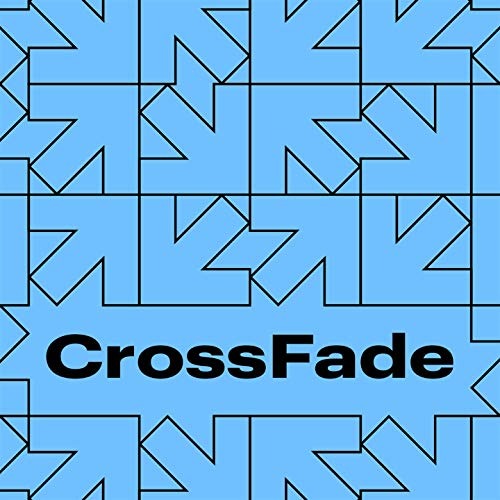
CrossFade: The Dueling Album Review Show (MinnMax)
By the time Matt Helgeson left Game Informer in 2015, the magazine’s ex-senior features editor was already a veteran podcaster. He had launched The Game Informer Show years earlier, and helped co-host Paul Charchian's radio show, Video Games Weekly, on KFAN.
Helgeson, who now works in marketing when he’s not getting banned by Elon Musk, was approached by former GI colleagues in 2020. His old associates had just founded MinnMax, a Patreon-supported podcast/Twitch/YouTube channel, and they wanted a music pod. A vet of the ’90s music Twin Cities music scene, Helgeson was in.
But he wasn’t interested in the shit-talking discourse you find on podcasts like Your Favorite Band Sucks; he wanted something resembling a loud, celebratory book club. (Fans of music news and hashing out trends should check out Steve Hyden's Indiecast, another great, locally produced music podcast.)
“I pick an album, the guest picks an album, and we compare notes,” Helgeson says. “I wanted to have something that didn’t feel adversarial. I try to get something out of every pick, even if it’s not in my wheelhouse.”
(The episode titles are presented in a format that could appear adversarial—“Metallica vs. Lucy Dacus,” “Public Enemy vs. Deftones,” “Weezer vs. Tropical Fuck Storm.”)
Memorable episodes include: Van Halen biographer Greg Renoff coming on the week Eddie Van Halen died; Tanzania-raised experimental hip-hop producer Infinity Knives introducing Matt to Texas country star Charley Crockett; and dorking out on video game music and Björk with former Classical MPR host/current podcaster Emily Reese.
Helgeson even learned to appreciate Blink-182, at some of the small things, after a guest exposed him to Travis Barker’s kickass drum fills on Enema of the State.
“It was a fun record,” the host admits. “I remember getting a lot out of Travis Barker, even if he’s playing on these pedestrian pop-punk songs. Way more challenging drumming than the song even calls for.”
Churning out bi-weekly episodes isn’t easy with a full-time career and daughter to tend to, but MinnMax is able to provide Helgeson a nice stipend. Their funding model is one of the major changes he’s noticed since those Wild West podcasting days at Game Informer.
“The crowd-funding has gotten a lot bigger. It’s obviously more competitive,” Helgeson says, noting that most CrossFade episodes attract around 1,200 listens. “We’re probably better than 99% of podcasts, because I think the average listenership is probably at zero. But we’re also a little shy of the point where you get Blue Apron, Stamps.com. I’ve gotten the impression you need to get five-digit numbers for that.”
